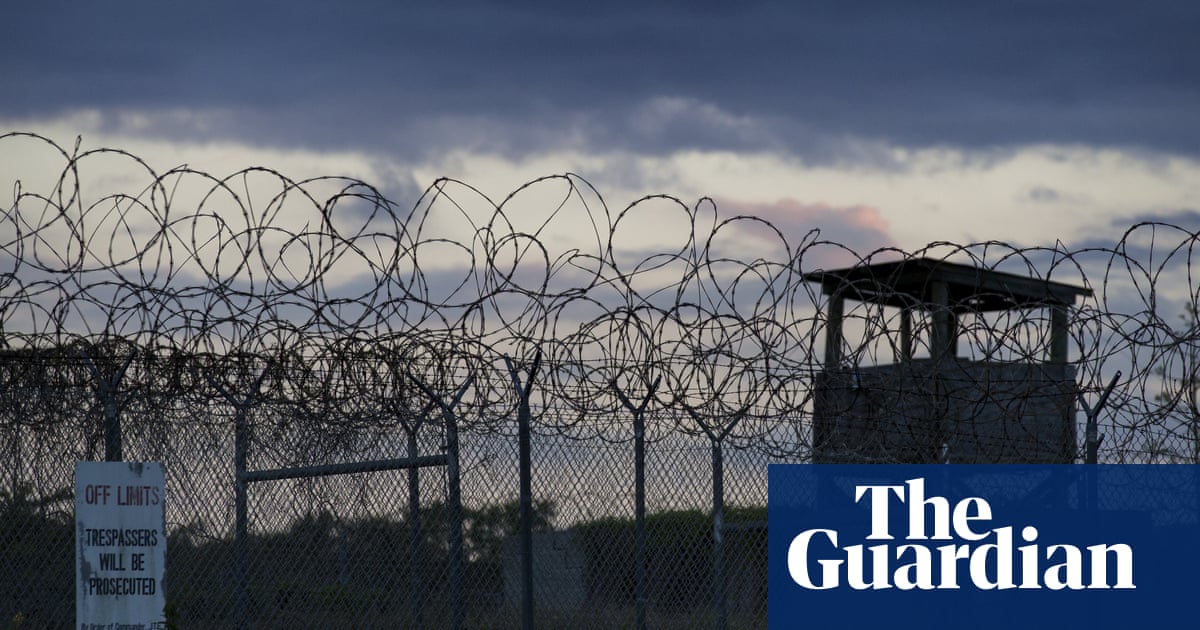The UK government’s decades-long efforts to keep details of its intelligence agencies’ involvement in the CIA’s notorious post-9/11 torture programme hidden will face an “unprecedented” challenge this week as two cases are brought before a secretive court.
The cases, filed by two prisoners held at the US military prison atGuantánamo Bay, will be heard across a rare four-day trial at the investigatory powers tribunal (IPT), which has been investigating claims the UK’s intelligence agencies were complicit in their mistreatment.
Starting on Tuesday, the trial will place a spotlight back on what is considered one of British intelligence’s darkest chapters, reviving longstanding questions about the extent of the UK’s involvement in the CIA’s kidnapping and detention of terrorism suspects in a global network of secret prisons known as black sites.
The hearings begin six years after ministers shelved a judicial inquiry into alleged UK complicity, which David Cameron, the prime minister who ordered it, once said was necessary as “the longer these questions remain unanswered, the bigger the stain on our reputation as a country”.
The claims before the IPT have been brought by Mustafa al-Hawsawi, who is accused by the US of aiding the hijackers behind the 9/11 terrorist attacks, and Abd al-Rahim al-Nashiri, who is alleged to have plotted al-Qaida’s bombing of an American naval ship in 2000.
Captured by the CIA in the early 2000s, the men were rendered between black sites, where they were systematically tortured and subjected to brutal and degrading treatment. Methods included what the CIA referred to as “rectal feeding”, a form of sexual assaultaccording to medical experts.
After several years in CIA detention, Hawsawi and Nashiri – who were among a group of 120 of the CIA’s “high-value detainees” – were transferred to Guantánamo Bay in 2006. They have been there since. Both men face charges carrying the death penalty, though neither of their cases at a special US military court have yet gone to trial.
Lawyers for the men have told the IPT there is credible evidence to infer that UK spy agencies, including MI5 andMI6, unlawfully “aided, abetted, encouraged, facilitated, procured and/or conspired” with the US in their torture and mistreatment.
Working in secret, the IPT has been examining the allegations over the past two years. Led by a senior judge, the tribunal is an unusual court that can adopt an inquisitorial process and has unique powers to obtain classified information from the intelligence agencies.
So far, the government has successfully prevented any findings from the investigation being disclosed, even to the complainants’ lawyers. But the trial is expected to compel the government to confront, in open court, uncomfortable legal questions about what constitutes complicity in torture.
“This level of judicial scrutiny is unprecedented,” said Chris Esdaile, a senior legal adviser at Redress, an NGO that works with torture victims and which represents Hawsawi. “Until now, efforts to lift the veil of secrecy and consider the full extent of the UK’s involvement in the CIA’s black site programme have been thwarted.”
When Cameron announced the judge-led public inquiry into allegations of UK complicity in the mistreatment of terrorism suspects in 2010, he told parliament: “Let me state clearly: we need to know the answers.”
Nine years later, the governmentabandoned that commitment. This was despite parliament’s intelligence and security committee concluding that British intelligence officers had been involved in “inexcusable” activities, including hundreds of cases in which prisoners were mistreated, and scores of rendition operations.
Publishing its findings in 2018, the committee emphasised its work had been “terminated prematurely” due in part to obstruction by ministers and spy chiefs. It insisted there were “questions and incidents” that “remain unanswered and uninvestigated”.
Among its findings, however, were key details that Hawsawi and Nashiri’s lawyers used to persuade the IPT to investigate. Crucially, the committee had highlighted instances in which MI6 had supplied questions to be used in CIA interrogations of two other high-value detainees it knew were being mistreated.
On the eve of the trial, evidence has now emerged that in 2003, while Hawsawi was held by the US in a black site in Afghanistan where he was repeatedly tortured, CIA headquarterssent a cableto interrogators, telling them Hawsawi should be “pressed” for information about alleged terrorist activity in the UK.
The cable, which Hawsawi’s lawyers are understood to have shared with the IPT, was declassified by the US in 2017 but only recently identified byUnredacted, a research unit at the University of Westminster that investigates UK national security practices.
Its director, Sam Raphael, who has spent yearsresearching the torture programme, said the cable suggested there had been a “clear interest in interrogating Hawsawi about specific UK-based operatives and plots at a time when he was being subjected to the worst kind of treatment”.
He added: “It raises an obvious and important question the tribunal should address: was British intelligence, which we know was directly and deeply involved in post-9/11 prisoner abuse, feeding the questions to the CIA?”
A spokesperson for the government declined to comment on the claims before the IPT. The government previously said that it “does not confirm or deny allegations, assertions or speculation about the activities of UK intelligence agencies”.
